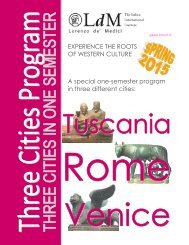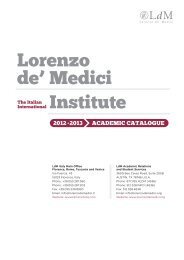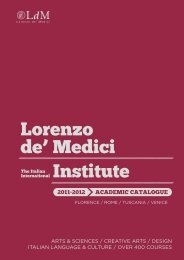aCademiC Catalog 2013-2014 - Lorenzo de Medici
aCademiC Catalog 2013-2014 - Lorenzo de Medici
aCademiC Catalog 2013-2014 - Lorenzo de Medici
You also want an ePaper? Increase the reach of your titles
YUMPU automatically turns print PDFs into web optimized ePapers that Google loves.
FLORENCE<br />
School of Arts & Sciences<br />
American writers. Another important aspect of the course will<br />
be the study of the history, the works of art, the monuments<br />
and the folklore events of the main Grand Tour <strong>de</strong>stinations:<br />
Venice, Florence, Rome. Stu<strong>de</strong>nts will learn about the different<br />
experiences of famous foreign travelers in Italy through the<br />
centuries and will be able to un<strong>de</strong>rstand some stereotypes,<br />
prejudices and i<strong>de</strong>alized visions about Italy and Italians that still<br />
survive today.<br />
Mathematics<br />
Topics in Mathematics for Liberal Arts<br />
MAT 130 F<br />
Cr: 3; Contact hrs: 45<br />
This is an elementary course for Liberal Arts majors. It <strong>de</strong>als<br />
with topics emphasizing fundamental i<strong>de</strong>as of mathematics,<br />
selected from set theory, algebra and geometry.<br />
Finite Mathematics<br />
MAT 240 F<br />
Cr: 3; Contact hrs: 45<br />
This course covers sets, real numbers, solution of equations,<br />
inequalities, functions, and elementary linear algebra.<br />
Prerequisites: MAT 130 Topics in Mathematics for Liberal Arts,<br />
or equivalent<br />
Calculus I<br />
MAT 260 F<br />
Cr: 3; Contact hrs: 45<br />
This course introduces stu<strong>de</strong>nts to <strong>de</strong>rivatives, minimum and<br />
maximum problems, applications to graphing, exponential<br />
and logarithm functions, growth and <strong>de</strong>cay, anti-<strong>de</strong>rivatives,<br />
<strong>de</strong>finite integrals and areas.<br />
History of World Cinema: from Lumière to<br />
Tarantino<br />
MCT 258 F<br />
Cr: 3; Contact hrs: 45<br />
The course is an introduction to the history, analytic concepts,<br />
and critical vocabulary necessary for un<strong>de</strong>rstanding cinema<br />
as a major art form of the 20th century. This course will look<br />
in particular at the history of different types of film style and<br />
storytelling, focusing on such movements and trends as early<br />
cinema, European avant-gar<strong>de</strong>, classical Hollywood cinema,<br />
Italian Neorealism, French New Wave, Postmo<strong>de</strong>rnism. It will<br />
also examine key directors, producers, stars and other pertinent<br />
figures involved in the film industry. Along the way we will cover<br />
important <strong>de</strong>velopments in technology and trends in what was<br />
popular, critically acclaimed, experimental and socially relevant.<br />
Music and Film<br />
MCT 270 F<br />
Cr: 3; Contact hrs: 45<br />
This is an introductory course which explores the role of<br />
music in one of the most important 20th century artistic and<br />
entertainment media: film. The course surveys film music from<br />
its silent era origins, in which music was a major component in<br />
conveying emotions, up to the present. Topics for discussion<br />
will inclu<strong>de</strong> film music history and the history of films. In the<br />
process, stu<strong>de</strong>nts will study the dramatic function of music as an<br />
element of cinematic “diegesis” and emphasis, the codification<br />
of musical iconography in the standard cinematic genres,<br />
the basics of filmmaking musical forms, associative listening,<br />
the important basic musical elements, film music techniques,<br />
and how composers use them in film scoring. Some of the<br />
cinema’s iconic scores and accompaniments will be discussed,<br />
from silent era movies through he films of such directors as<br />
Hitchcock, Kubrick, and Fellini.<br />
Music, Cinema and Theatre<br />
Studies<br />
Italian Cinema and Society<br />
MCT 200 F; Dual listed: SOC 201 F<br />
Cr: 3; Contact hrs: 45<br />
This course explores Italian cinema from its origins to the<br />
present time, within the socioeconomic and historical context<br />
of Italian culture and society. The course is based on the<br />
premise that film can be usefully employed for studying a<br />
society’s history and culture, including such areas as customs,<br />
i<strong>de</strong>ologies, discourses, gen<strong>de</strong>r roles and social problems. Areas<br />
of particular focus will inclu<strong>de</strong> Fascism, World War II, the<br />
economic miracle, the southern question, political terrorism<br />
of the 1970s, commercial television, the Second Republic, the<br />
Mafia, and the contemporary phenomenon of immigration.<br />
Along the way we will be looking at some of the major works<br />
of key directors, as well as at the most important genres of<br />
popular cinema, giving particular attention to the intellectual,<br />
historical, cultural, and literary matrix of each movie. Through<br />
analyzing the ways in which Italian cultural, social and political<br />
conflicts are portrayed and worked out both in art films and<br />
popular cinema, stu<strong>de</strong>nts will be encouraged to reach an<br />
un<strong>de</strong>rstanding of the possibilities of film both as work of art<br />
and as cultural document.<br />
Un<strong>de</strong>rstanding Movies: Theory and Practice<br />
MCT 215 F; Dual listed: FVM 215 F<br />
Cr: 3; Contact hrs: 45<br />
Moving images are among the most distinctive innovations and<br />
experiences of the last century and remain one of the most<br />
enduring. In a media-<strong>de</strong>pen<strong>de</strong>nt culture, <strong>de</strong>veloping a critical<br />
un<strong>de</strong>rstanding and practical knowledge of this form are vital.<br />
This course studies the theory as well as the techniques of<br />
filmmaking. It analyzes the ever-evolving cinematic language<br />
in terms of both its historical <strong>de</strong>velopment and its essential<br />
elements, techniques and tools. Through the study of stylistic<br />
choices and the construction of images and sequences,<br />
stu<strong>de</strong>nts learn aesthetic and technical terms, rules, conventions,<br />
and social assumptions used to build meaning. In a series of<br />
stylistic exercises, stu<strong>de</strong>nts engage in hands-on experience of<br />
vi<strong>de</strong>o shooting.<br />
Introduction to Italian Theatre<br />
MCT 275 F<br />
Cr: 3; Contact hrs: 45<br />
This course covers the origins of Italian theatre from the early<br />
period to the beginning of the 20th century. Topics covered will<br />
inclu<strong>de</strong> the Renaissance theatre (among others, Gli Ingannati,<br />
Ariosto, Secchi), Baroque theatre, Commedia <strong>de</strong>ll’Arte, the<br />
17th century and Goldoni, the 19th century theatre and its<br />
connections with Opera (including Rossini and Verdi). The<br />
course will conclu<strong>de</strong> with the rise of mo<strong>de</strong>rn theatre with a<br />
particular focus on Piran<strong>de</strong>llo.<br />
World Beat: Exploring Global Music<br />
MCT 280 F<br />
Cr: 3; Contact hrs: 45<br />
This class, which <strong>de</strong>als with individuals and societies around<br />
the world, aims to explore human musical life in its fullness<br />
and diversity. It provi<strong>de</strong>s an overview of the most important<br />
musicians’ works with emphasis on their characteristics and<br />
roles in the technological <strong>de</strong>velopment and survival of musical<br />
traditions in a global context of constant intercultural contact<br />
and change. It also proposes an original approach to so-called<br />
“ethnic music” via the study of the “world beat” or “world music”<br />
phenomenon, which represents the most contemporary aspect<br />
of ethnic music on the global market. All artists are presented in<br />
relation to their own musical roots, their traditional background<br />
and their socio-political statements and legacy.<br />
Introduction to Italian Opera<br />
MCT 285 F<br />
Cr: 3; Contact hrs: 45<br />
The course surveys the historical and artistic evolution of<br />
Italian Opera, from its beginnings in the classical atmosphere<br />
of the late Renaissance, through the extravagant Baroque, the<br />
passionate period of Romanticism up to the last exciting works<br />
of the early mo<strong>de</strong>rn age. The bulk of the program is <strong>de</strong>dicated<br />
to the great repertoire of the 1700s and 1800s, still today the<br />
most popular and frequently performed. The course follows<br />
a special approach exploring the social, philosophical and<br />
literary forces that shaped Opera. Particular emphasis is placed<br />
on the musical aspects of Opera, like the style of singing, the<br />
different roles on stage, the evolution of the orchestra and its<br />
72<br />
LdM Aca<strong>de</strong>mic <strong>Catalog</strong> <strong>2013</strong>-<strong>2014</strong>





